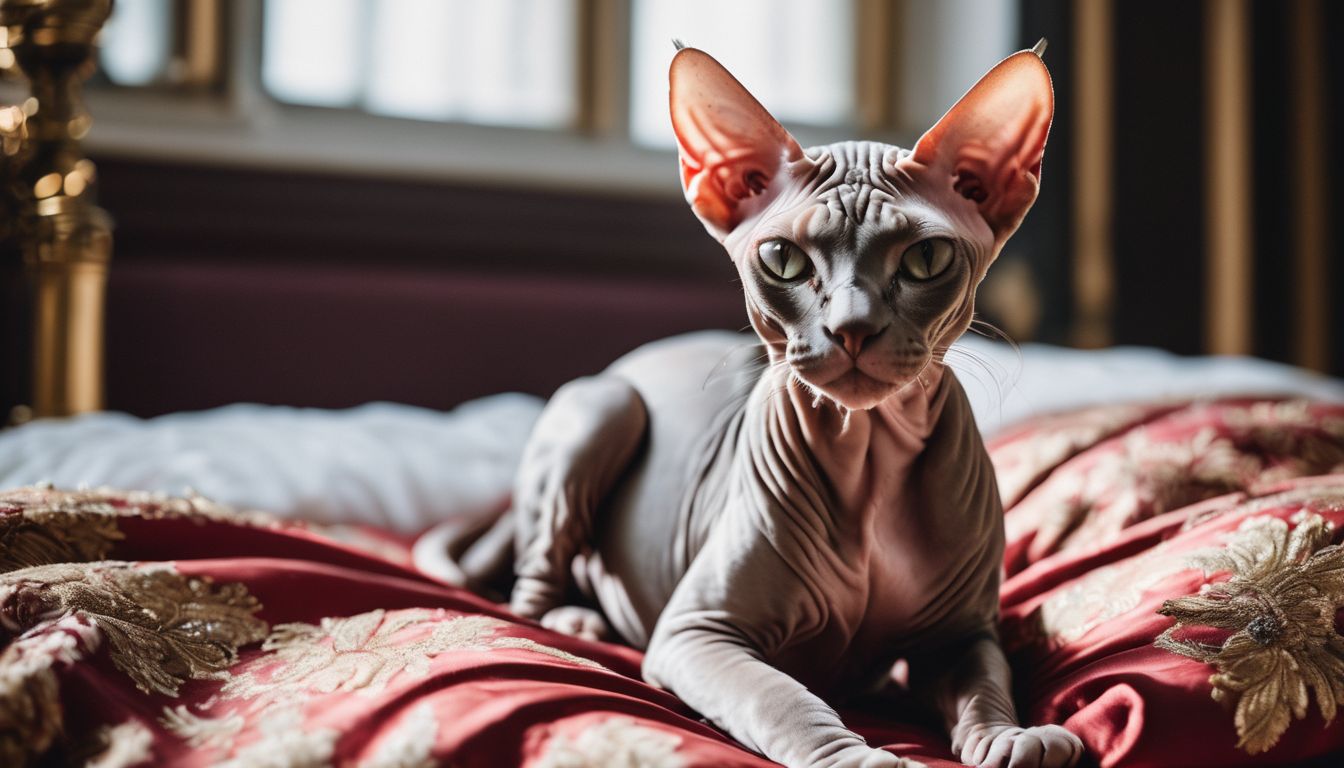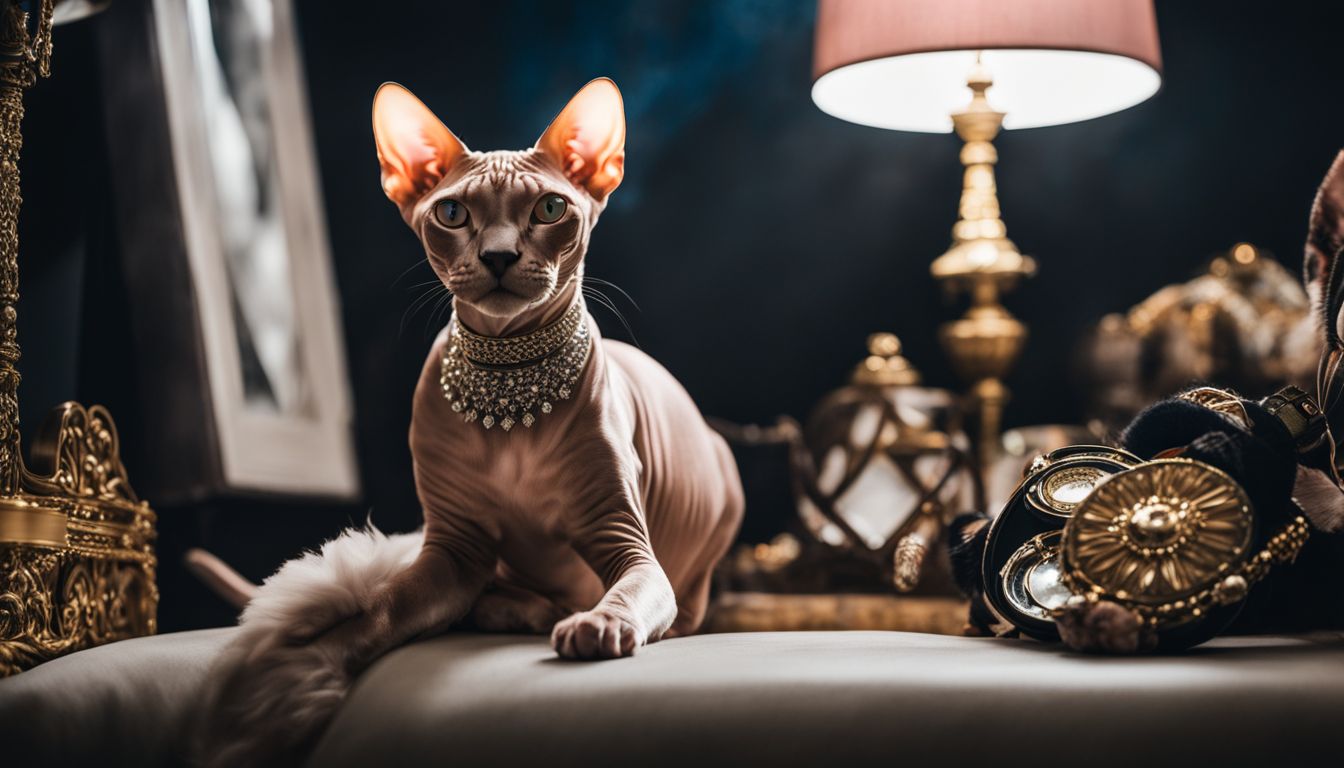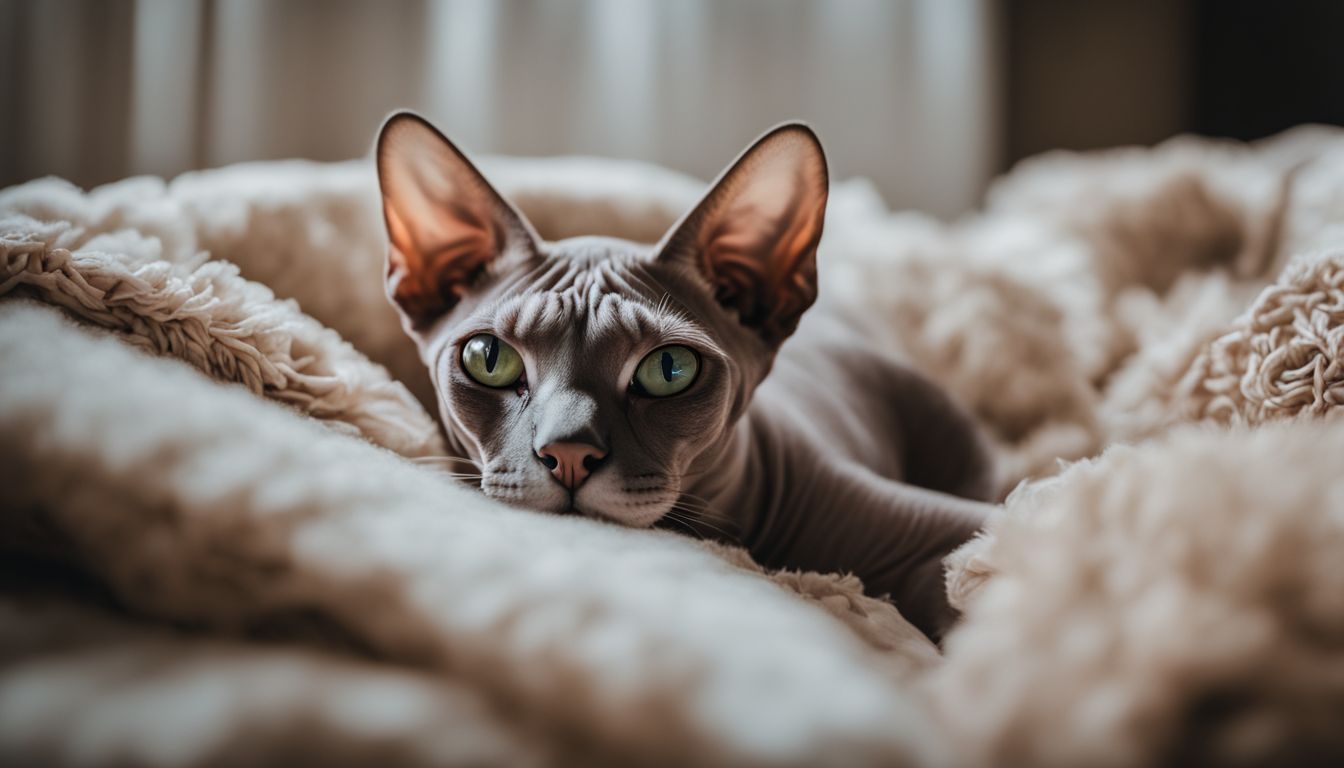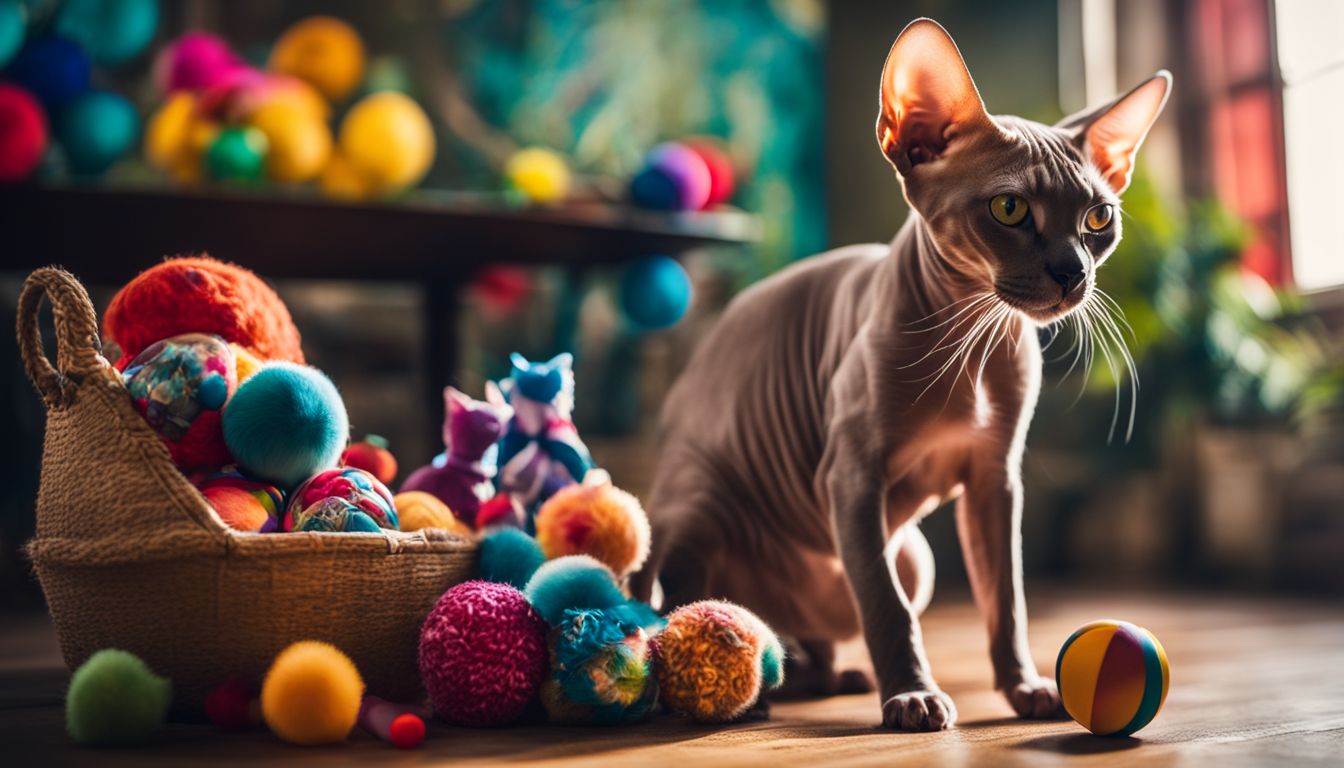Are you captivated by the unique charm of hairless cats and contemplating getting one? The Sphynx, popularly known as the hairless cat breed, is not your typical pet in terms of care and especially cost.
This article aims to demystify all aspects revolving around owning a Sphynx cat – from pricing considerations to added expenses – so you can confidently decide if this adorably eccentric feline is right for you.
Let’s delve into the world of Sphynx ownership!
Key Takeaways
- Sphynx cats are a unique and hairless breed known for their warm and affectionate personalities.
- The cost of owning a Sphynx cat includes the purchase price, additional expenses such as health care, food and supplies, insurance costs, and entertainment expenses.
- Factors that affect the cost of a Sphynx cat include pedigree status, the reputation of the breeder, and the age and gender of the cat.
- You can adopt a Sphynx cat from a shelter at a lower cost or purchase one from a reputable breeder.
Contents
- Overview of Sphynx Cats
- Cost of Owning a Sphynx Cat
- Factors That Affect Sphynx Cat Costs
- Where to Buy a Sphynx Cat
- Other Costs to Consider
- Conclusion
- FAQs
- 1. How much does a hairless cat cost?
- 2. Are there any ongoing costs associated with owning a hairless cat?
- 3. What factors should I consider before getting a hairless cat?
- 4. Do hairless cats require any special care compared to other cats?
- 5. Where can I find reputable breeders for purchasing a hairless cat?
Overview of Sphynx Cats

Sphynx cats are a unique and distinctive breed known for their hairless appearance. They have a sleek body, prominent cheekbones, large ears, and vibrant eyes. Originally from Canada, these cats were bred to lack fur due to a genetic mutation in the 1960s.
Despite their lack of fur, Sphynx cats have a warm and affectionate personality, making them popular pets among cat enthusiasts.
Breed Information
Sphynx cats are unique. They don’t have hair like other cats. This makes them special but they need care too. They come from Canada and were bred in the 1960s to be hairless. In the wild, these cats may not survive due to lack of fur.
Sphynx cats are playful and love people a lot. They also stay healthy for many years if cared for well.
Breed Characteristics
Sphynx cats stand out for their smooth, hairless skin. These unique cats feel warm and soft to touch, like suede. They have large ears and wide-set eyes which often shine with a playful, friendly look.
Sphynx cats are strong and muscular but also very agile. They love to climb and explore high spots in the house. Many people love them for their social nature as they enjoy cuddling and spending time with humans.
Despite not having fur, these cats come in various colors and patterns seen on their skin pigments.
History and Origins
Sphynx cats started in Canada in 1966. A house cat gave birth to a hairless kitten named Prune. This was from a natural gene line. The breeder, named Yania Bawa, saw this as special and started the Sphynx breed.
Further breeding led to more hairless kittens. People found them unique and lovely. In 1970, Dutch and American breeders joined the program too. Now the sphynx is known worldwide for its bald look.
Cost of Owning a Sphynx Cat

Owning a Sphynx cat comes with various costs, including the purchase price of the cat itself, additional expenses such as health care, food and supplies, insurance costs, and entertainment expenses.
Purchase Price of a Sphynx Cat

The purchase price of a Sphynx cat can vary depending on different factors. On average, you can expect to pay between $1,500 and $3,000 for a Sphynx kitten. However, some purebred or championbred cats can be more expensive.
The reputation of the breeder also plays a role in the cost, as well as the age and gender of the cat. It’s important to consider these factors when budgeting for your new furry friend.
Additional Costs
Owning a Sphynx cat comes with additional costs that you should consider. These include:
- Health care costs: Regular check-ups, vaccinations, and potential medical issues.
- Food and supplies: Specialized food, litter, toys, scratching posts.
- Insurance costs: Consider getting pet insurance to help cover potential vet bills.
- Entertainment expenses: Cat trees, interactive toys, and other items for their enrichment.
Health Care Costs
Sphynx cats require regular health care, which can add to the overall cost of owning one. Here are some factors to consider:
- Veterinary Expenses: Regular check-ups, vaccinations, and preventive treatments (such as flea and tick control) are essential for a healthy Sphynx cat.
- Neutering/Spaying: This is an important procedure that helps prevent unwanted kittens and certain health issues.
- Health Tests: Sphynx cats are prone to some genetic conditions, so it’s recommended to perform tests like HCM heart scans and blood tests for underlying health issues.
- Medications: In case your cat develops any health problems or requires long-term medications, the cost can increase.
- Emergency Care: Unexpected medical emergencies can happen, so it’s wise to have a contingency plan in place.
Food and Supplies
Caring for a Sphynx cat requires specific food and supplies. Here’s what you’ll need:
- Specialized Cat Food: Sphynx cats have unique dietary needs. Look for high-quality cat food that is specially formulated for hairless breeds.
- Litter Box and Litter: Provide a litter box and choose a low-dust, unscented litter that won’t irritate your cat’s skin.
- Toys and Scratching Posts: Keep your Sphynx entertained with toys and scratching posts to prevent boredom and encourage exercise.
- Bedding or Blankets: Since Sphynx cats don’t have fur, they appreciate warm, cozy bedding or blankets to cuddle up in.
- Grooming Supplies: Although Sphynx cats don’t require grooming like other breeds, they still need regular ear cleaning, nail trimming, and bathing using mild, hypoallergenic shampoos.
- Climbing Structures: Sphynx cats love to climb and explore their environment. Consider investing in cat trees or climbing structures to satisfy their natural instincts.
Insurance Costs
Insurance costs are an important factor to consider when owning a Sphynx cat. Having insurance can help cover the expenses of any unexpected medical issues or accidents that may occur.
The cost of insurance will depend on several factors, such as the age and health condition of your cat, as well as the coverage options you choose. It is recommended to shop around for different insurance providers to find the best coverage at a reasonable price.
Keeping your Sphynx cat insured can provide you with peace of mind knowing that their healthcare needs are taken care of without breaking the bank.
Entertainment Expenses
Entertainment expenses are an important consideration when owning a Sphynx cat. These cats are known to be active and playful, so it’s crucial to provide them with plenty of stimulation and toys.
The cost of entertainment for your Sphynx cat can vary depending on your budget and preferences. Some common expenses may include purchasing interactive toys, scratching posts, climbing trees, and puzzle feeders.
You may also want to invest in regular playtime sessions or even consider enrolling your cat in agility or training classes. Overall, the entertainment expenses for your Sphynx cat should be taken into account when budgeting for their care.
Factors That Affect Sphynx Cat Costs

The price of a Sphynx cat can vary depending on factors such as pedigree, breeder reputation, and age and gender of the cat. Find out more about these factors that influence the cost of owning a hairless cat in this section.
Pedigree and Purebred Status
The pedigree and purebred status of a Sphynx cat can significantly impact its cost. Purebred Sphynx cats, especially those with champion bloodlines, tend to be more expensive than those without pedigree documentation.
This is because breeders invest time and resources in breeding high-quality cats that meet breed standards. The reputation of the breeder also plays a role in pricing, as reputable breeders often charge higher prices due to their expertise and commitment to producing healthy kittens.
When considering the cost of a hairless cat, it’s important to factor in these variables related to pedigree and purebred status.
Reputation of Breeder
One important factor to consider when buying a Sphynx cat is the reputation of the breeder. You want to make sure you are purchasing from a reputable breeder who has good reviews and a track record of healthy and well-cared-for cats.
A reputable breeder will provide proper documentation for the cat’s pedigree, health checks, and vaccinations. They will also be knowledgeable about the breed and be available to answer any questions or concerns you may have.
It’s worth taking the time to research and find a trusted breeder to ensure that you get a happy and healthy hairless cat.
Age and Gender of Cat
The age and gender of a cat can also affect the cost of owning a hairless cat. Generally, kittens are more expensive because they require more care and vaccinations. Older cats might be cheaper to purchase upfront, but they may have additional health issues that need ongoing medical attention.
Moreover, female cats tend to be pricier than males because they can breed and produce kittens. If you’re not planning on breeding your cat, a male might be a more affordable option.
Keep in mind that these factors vary depending on the breeder and individual circumstances, so it’s essential to do your research before making a decision about the age and gender of your hairless cat companion.
Where to Buy a Sphynx Cat

You can either adopt a Sphynx cat from a shelter or purchase one from a reputable breeder.
Adopting from a Shelter
If you’re considering getting a Sphynx cat, adopting from a shelter is a great option. Shelters often have hairless cats available for adoption at lower costs compared to buying from a breeder.
Plus, by adopting from a shelter, you’re giving a cat in need a loving home. Make sure to ask the shelter about the cat’s health and any special care needs they may have. It’s also important to consider factors like their age and gender when making your decision.
Overall, choosing to adopt can be an affordable and rewarding way to bring a Sphynx cat into your life.
Purchasing from a Breeder
If you decide to buy a Sphynx cat from a breeder, there are some important things to consider. First, make sure the breeder has a good reputation and takes good care of their cats.
It’s also important to ask about the cat’s pedigree and whether they come from champion lines. The age and gender of the cat can also affect the price. Keep in mind that purchasing from a breeder will likely be more expensive than adopting from a shelter, but you may have more options when it comes to specific breeds and characteristics.
Other Costs to Consider

In addition to the initial purchase price and ongoing health care costs, there are several other expenses to consider when owning a Sphynx cat. These include the cost of initial supplies and set up, grooming and maintenance, as well as any additional entertainment expenses for your furry friend.
Initial Supplies and Set Up
Getting a hairless cat requires some initial supplies and set up. Here are the things you’ll need:
- Cat Bed: Provide a comfortable bed for your new cat to sleep in.
- Litter Box: Buy a litter box and choose a suitable litter for your cat’s needs.
- Food and Water Bowls: Get separate bowls for food and water.
- Scratching Posts: Cats need to scratch, so get some scratching posts or boards.
- Toys: Keep your cat entertained with toys like balls, wand toys, and interactive toys.
- Grooming Supplies: Hairless cats still require grooming, so invest in grooming tools like specialized brushes or wipes.
- Climbing Structures: Consider providing climbing structures like cat trees or shelves for your cat to explore and play on.
Grooming and Maintenance
Grooming and maintaining a hairless cat, like the Sphynx, requires some extra care. Here are important things to keep in mind:
- Bathing: Hairless cats need regular baths to remove excess oils from their skin. Use a mild, hypoallergenic shampoo and warm water. Be sure to dry them thoroughly after bathing.
- Ear Cleaning: Their large ears can accumulate wax and debris, so clean them regularly with a gentle ear cleaning solution approved by your veterinarian.
- Skin Care: Hairless cats have sensitive skin that needs moisturizing. Use a vet-recommended moisturizer or coconut oil to prevent dryness and cracking.
- Nail Trimming: Regular nail trims are important for hairless cats too. Trim their nails carefully to avoid injury.
- Dental Care: Just like any other cat, hairless cats need their teeth cleaned regularly to prevent dental issues. Brush their teeth using toothpaste made specifically for cats.
- Room Temperature: Hairless cats don’t have fur to keep them warm, so make sure they have access to warm areas in colder months.
- Sun Protection: Hairless cats are susceptible to sunburn due to their lack of fur protection. Apply pet-safe sunscreen if they’re exposed to direct sunlight.
- Litter Box Hygiene: Keep the litter box clean at all times as hairless cats may be more prone to litter box aversion due to the absence of fur insulation.
Conclusion

In conclusion, owning a hairless cat like the Sphynx can be a rewarding experience, but it does come with costs. The price range for a Sphynx cat can vary depending on factors like pedigree, breeder reputation, and age or gender of the cat.
It’s important to consider these factors along with additional expenses such as health care, grooming, and supplies when budgeting for a hairless cat. Ultimately, the cost is worth it for those who are committed to providing the love and care that these unique cats deserve.
FAQs
1. How much does a hairless cat cost?
The price of a hairless cat can vary depending on factors such as breed, age, and location, but generally ranges from $1,000 to $3,000.
2. Are there any ongoing costs associated with owning a hairless cat?
Yes, there are ongoing costs for owning a hairless cat such as food, veterinary care, grooming supplies (like sunscreen), and regular check-ups which should be considered before getting one.
3. What factors should I consider before getting a hairless cat?
Some important factors to consider before getting a hairless cat include their special grooming needs (such as frequent bathing) due to their lack of fur, potential allergies in your household or among family members and the time commitment required for their care.
4. Do hairless cats require any special care compared to other cats?
Hairless cats require some extra care compared to other cats due to their lack of fur. This includes protection from sunburns by applying sunscreen when necessary and ensuring they stay warm during cold weather.
5. Where can I find reputable breeders for purchasing a hairless cat?
To find reputable breeders who specialize in hairless cats like the Sphynx or Bambino breeds it is recommended that you do thorough research online or seek recommendations from local pet enthusiasts or veterinarians in your area.

